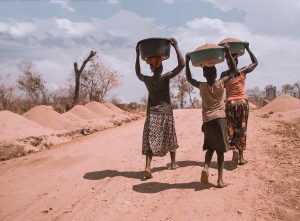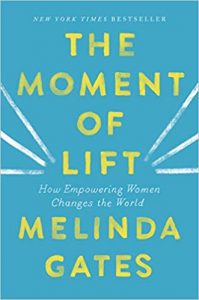Women and Food
![]()
The title doesn’t address what you may think, as in the women (like me) who love food too much.
It addresses the truth that empowering women to produce and sell food strengthens whole societies. Mennonite Central Committee and the United Nations’ Commission on the Status of Women say so and have advocated for women for many years.
And Melinda Gates powerfully says so in her 2019 book The Moment of Lift.
In Chapter 7: ‘Seeing Gender Bias, Women in Agriculture’ Gates tells the story of Patricia, a hardworking woman in Malawi who worked her half-acre plot of ground, while doing all the other chores: women’s work. Everything needed to succeed was denied her: ‘good land, good seeds, framing supplies, time, and know-how’. In her small village, women were still not allowed to inherit land, even though the government had recently decreed that they could. Patricia had to rent her land. Being a wife, she had to follow her husband’s dictates on how the family budget was spent and how she allotted time to her many tasks. In that society, men were literally dictators.
(Gates and her daughter spent time in another remote village doing the work that the woman of the house did. They were exhausted and sore from the typical seventeen hours of chopping wood, walking many miles to get water, cooling meals, cleaning, and kid care.)
Thus, Patricia had little time to take care of the crops that could feed the family and be sold at market. She could not hire help because males wouldn’t work for a woman. She had neither the time, nor the cultural right, to attend meetings of aide organizations that told the region’s men how to improve seeds and production.
When the Bill and Melinda Gates Foundation received Warren Buffet’s huge monetary contribution, they decided to focus on the world’s poorest people and found that ’70 percent’ of them farmed their own little plots of land, often with poor yield. At first, they put resources into teaching about production, and making monies available, only to find—through the hard work of committed individuals who would live and work in these areas (think MCC voluntary service)—that it was women who were doing most of the work of farming. The problem was more difficult than they had originally thought. Simply providing better technology wouldn’t work because women hadn’t the time or cultural power to farm productively.

Photo by Ninno JackJr on Unsplash
CARE Pathways, a program designed to teach conventional farming tips AND male-female equality, impacted Patricia’s life. She asked her husband to join her at the CARE sessions and was surprised when he said that he would (in his own moment of lift!) In one session they role-played by switching places—she was allowed to boss him around. In another session they created a family budget that looked like a tree with roots and discussed which roots and branches would best help them get ahead if nurtured. Patricia and her husband changed their marriage. The husband listened and consulted with her, they began to work as partners, and not only did she have enough to feed the family but she was able to sell seeds and pay for their children’s school fees.
Imagine Patricia’s courage in challenging her husband to see things differently, but imagine his courage also. When both men and women accept the beating of wives, child marriage and mutilation, unpaid labor as a woman’s lot, and the ancient belief of women’s inferiority it takes courage, those moments of lift, to speak up.
In another illustration, Gates tells of a woman in Tanzania who asked her husband if he would fetch the water after working at a commercial stand, while she nursed their son and did many hours of unpaid labor per day, which included walking miles to fetch water. This husband was one of the good ones, and he agreed to her request, receiving the taunts and disdain of the other husbands. Something happened, though. Slowly the other men began to fetch water for their families, and realizing how difficult the 24-mile (!) round-trip was, they pulled together and built a rainwater collection system for the community. Moments of lift.
Gates has found that women lifting each other up—not to make themselves higher than men, but to become partners with them—produces the real joys in life: acceptance, bonding, and love. Plus the financial means to rise above abject poverty.
Melinda Gates also leads her organization Pivotal Ventures, an investment company to aid women and families in the United States.
Mennonite Central Committee (short video below) and Ten Thousand Villages work with and provide opportunities for women in emerging economies. They obey the Anabaptist commitment to Peace and Justice.
____________________________
I welcome your comments: gretaholtwriter.com/blog.
{Thank you to my niece, Addie Liechty, for taking the picture that is this blog’s featured image. Her blog is: https://addieswriting.wordpress.com.}
Best wishes and have a good week.
Greta

This is the world I want.
Oh, me too, MT. The United States need to reclaim its soul.
Thank you, Greta, for this much needed lift. If we would all show the same courage and become partners!
Agreed. Thank goodness for everyday courage.